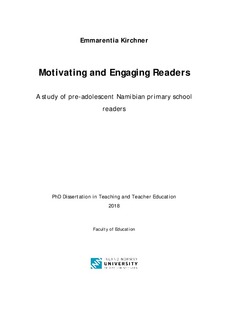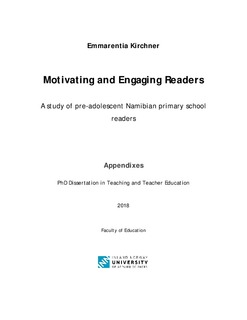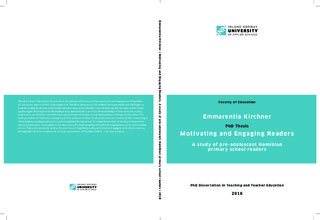| dc.description.abstract | This PhD study broadly aims to contribute to the body of knowledge of the reading preferences, activities, motivation and engagement of Namibian pre-adolescent learners. A mixed research design has been employed and the overall research question formulated as: What are the reading preferences, reading motivation and reading engagement of pre-adolescent primary school learners in Namibia?
The theoretical framework of the study included an approach to reading comprehension (as developed by the RAND study group) that recognised the importance of reader, text and activity when interacting in a specific social and cultural context. Furthermore, the study regarding reading motivation and engagement was enriched by the reading engagement model developed by Guthrie, Wigfield, Klauda and You, as well as the theories of Self-Determination (Ryan and Deci) and Expectancy Value (Wigfield and Eccles).
The findings have been reported in three articles. While broad aspects of texts and readers in seven Namibian regions (both rural and urban) were investigated in the first phase, the reading activities, motivation and achievements of a number of pre-adolescent, Namibian readers in one urban region were the focus of Phase Two. An action research innovation concerning reading for pleasure in one urban school concluded the final phase. Learner views of selected changes in classroom practices, and influence of these on their reading motivation and engagement, were investigated in this final phase.
In Article One, as far as the socio-economic situation was concerned, as well as the resource status in schools in the regions studied in the first phase, findings depict a landscape of deprivation. Results indicate that only 22.4% of the sample (N=1402 from 36 schools) could be regarded as readers who read for pleasure. This small group of learners had positive perceptions of reading, and they read mainly for instrumental and utility reasons.
The second article reports moderate reading activity and high levels of motivation among the participants (402 Grade Seven learners from six schools in one urban region). Learners reported that they read fiction in traditional print mode more often than in digital format, and read more for pleasure than for academic purposes. Motivation was recognised as a multifaceted concept and positive relationships between motivation and reading activity, as well as between reading motivation and reading achievement, were established.
Results presented in Article Three indicate that the implementation of enabling principles in the programme (such as choice and interaction), in an action-inspired project, enhanced the rediscovery of the joy of reading among the participants (N=48), and that attention to reading for pleasure was important in developing reading motivation. The value of the study lies in the attention given to the way that students viewed the development of guidelines for similar programmes, as well as in the illustration of useful strategies for building a reading culture in schools.
Across all three phases, the study demonstrates that pre-adolescent learners were aware that reading was important, and that they were motivated to read despite the challenging circumstances regarding reading opportunities and resources that most learners faced, as was described in Phase One. It is concluded that alternative ways to bring books and other reading material to children in Namibia will have to receive continued attention. The value of this study, furthermore, lies in the opportunity it afforded learners to influence teaching and learning through documenting and implementing their views and opinions in an action research based design. | nb_NO |



